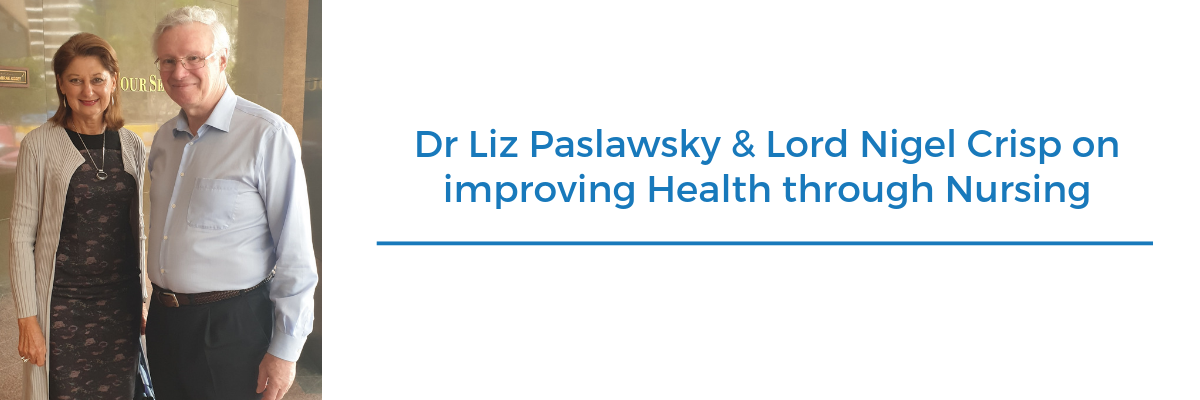A global initiative – the heart of health care that is the workforce
21 May 2019

Lord Nigel Crisp recently came to Australia to launch the “Nursing Now” campaign, a three-year global campaign (2018-2020), which aims to improve health by raising the profile and status of nursing worldwide.
Since retiring as the Chief Executive of the National Health Service (NHS) and the Permanent Secretary of the Department of Health of the United Kingdom Lord Crisp has been very active in global health and international development particularly in Africa. He is co-chair of the UK All-Party Parliamentary Group on Global Health and has published 4 books, the most notable for me was Turning the world upside down – the search for global health in the 21st Century, 2010. The book argues for a change in mindset from developed countries educating the third world countries on health to mutual two way learning. There are many examples in the book where poorer countries have developed substantial and successful services in healthcare with very few resources.
I have had the privilege of knowing Lord Nigel Crisp for the past 8 years. We met supporting the growth of SALUS Global Knowledge Exchange in London which focuses on promoting “healthy” health infrastructure. Lord Crisp was also my mentor when I was working in London for the global company International SOS.
We again met in Sydney during his recent visit where I could ask some specific questions relevant to health executives especially across Australia and New Zealand.
Congratulations on the global initiative “Nurses Now” campaign. You have always had a strong interest in workforce issues but why single out nurses and midwives?”.
There are many reports on improvements in healthcare globally that focus on the mechanical side of health care including technology and financial efficiency but relatively few that focus on the heart of health care that is the workforce.
This Campaign was launched following a report by the All-Party Parliamentary Group on Global Health (APPG) in 2016 titled “ Triple Impact – how developing nursing will improve health, promote gender equality and support economic growth”. The report argued that Universal Health Coverage will not be achieved unless we strengthen nursing (half the health workforce). To achieve this we need to rectify a global problem that nurses are systematically undervalued and unable to work to their full potential. Strengthening nursing will have the triple impact of improving health, promoting gender equity, and strengthening local economies.
Why is this initiative so important now?
Today the greatest burden of disease in all regions of the world is the growth in non‐communicable diseases. Many are chronic diseases. Non-communicable diseases, is not only a burden on health expenditure it can seriously undermine a country’s social and economic development.
To address this requires greater focus on the determinants of health and the range of behavioural, biological, socio-economic and environmental factors that influence the health status of individuals and populations. We need Australia, New Zealand and all countries to place greater emphasis on prevention of disease and promotion of health and well‐being with more services being delivered in the community and in people’s homes.
And this is why nurses are so important. They are the health professionals who are closest to the community they have a particular role in developing new models of community based care and supporting local efforts to promote health and prevent disease.
Furthermore nursing philosophy, values and practice are fundamentally aligned with this shift in approach and ideally suited to implement it. Nurses aim to provide holistic care, patient‐centred and personal care that takes account of the social and physical
environment. They are interested in the experience of care as an important outcome of the process.
What are you hoping to achieve in the 3 years?
Overall Nursing Now seeks to empower nurses to take their place at the heart of tackling 21st Century health challenges and maximize their contribution to achieving Universal Health Coverage.
We can have a massive impact on health by strengthening nursing with particular action in 5 areas – nurse-led clinics, particularly for Non Communicable diseases; more specialist and practitioner nurses; more midwifery; putting nurses at the centre of primary care; and giving nurses a bigger role in health promotion and disease prevention.
The campaign will focus on: ensuring that nurses and midwives have a more prominent voice in health policy-making; encouraging greater investment in the nursing workforce; recruiting more nurses into leadership positions; conducting research that helps determine where nurses can have the greatest impact; and sharing of best nursing practices.
Every country has different areas of emphasis depending on their gaps in recognising nurses and midwives. In Australia how many nurses and midwives are actively involved in health policy making? Do you have nurses on intergovernmental advisory panels, and health policy advisory committees?
You mentioned that Action Now campaign was launched in America the same day as in Australia how globally widespread is the movement?
There are now 200 groups in 80+ countries – the US and Australia launched on the same day; Brazil and Ireland next week; Zimbabwe, Spain and Italy the week after – 70+ others have already done so.
This is a massive global movement and the WHO is designating 2020 the Year of the Nurse and the Midwife. So everyone will hear a lot about nurses in the next 18 months and I hope we can see some practical changes happening.
Put simply, I believe that strengthening and developing nursing is one of the single most important things we can do to improve health globally.Working together, I am confident that we will see great progress in the next 3 years.
The website to become involved http://nursingnow.org

